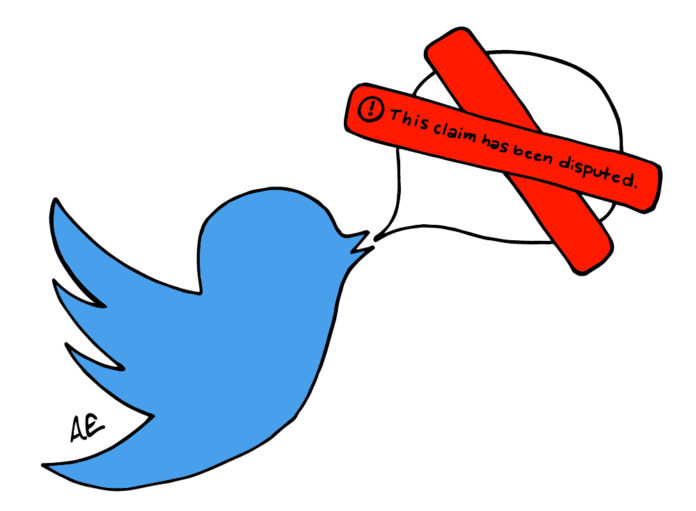Between the political climate of the United States and the coronavirus pandemic, social media may seem riskier to use than ever. Opinions are one thing, but relaying information is another.
When it comes to knowing what is real and what isn’t on social media, platforms like Instagram and Twitter have taken matters into their own hands to put disclaimers on posts that could be false information. In some instances, posts may be taken down. This has caused some users to question their freedom of speech on social media.
American government teacher Logan Kelim said he thinks this action taken by social media platforms has some grey areas.
“When social media companies go down that road, it sets, at times, a bad precedent because sometimes they are picking and choosing what’s accepted and what’s not. However, I think, too, though, that it goes without saying that a lot of these social media platforms as well do have their own terms and agreements,” Kelim said, “With the idea of freedom of speech, the social media platforms can allow that, but also it’s their domain and it’s their platform that they’re using and the terms and the rules and regulations that they set. They can enforce that.”
When it comes to whether these disclaimers are doing more harm than good, Kelim said it’s currently hard to tell if there are more positives or negatives.
“I think that over the last four years, with a large push of foreign entities pushing incorrect information or misinformation, I do think that these large tech companies do hold a responsibility to help to fact check and to make sure that the correct information is out there … However, on the flip side, there can be some negatives as well of that content that’s allowed versus content that’s not allowed and what it does for society,” Kelim said.
Junior Grace Westbrook said she thinks these social media platforms made a good decision for putting disclaimers on posts, especially when it comes to content that could be sensitive to users, such as posts that could be triggering.
“I think that people can be sensitive or have triggers on certain things, so I think it’s good to put stuff like that so people can click those and learn more and educate themselves on those topics if they would like to,” Westbrook said. At the same time, Westbrook said she thinks the warnings for sensitive content could be more specific.
“I think they should build on that a little more and make that technology a little more specific with the fact of having a category that the picture is in. Like, ‘This could have content of abuse or misconduct’, like that kind of stuff instead of just ‘sensitive content,’” Westbrook said, “You click on it and you really don’t know what you’re clicking on, so it could be really damaging to some people.”
As for disclaimers on posts about things like COVID information or the election, Westbrook said she is not 100 percent sure if freedom of speech is being taken away. “I think it could and it couldn’t because it depends on what the person is posting or what the disclaimer is on that.”
For sophomore Harper Barnard, she said she thinks social media platforms made the right move to put disclaimers on certain posts.
“I think it’s super cool and super necessary, especially with the political atmosphere. There’s a lot of misinformation, a lot of biased information, and the headlines are super misleading. So, I think it’s super necessary to make sure the information you’re getting is super accurate and from neutral sources,” Barnard said. On the freedom of speech aspect, Barnard said she doesn’t think these disclaimers are taking that freedom away.
“I don’t think being called out for misinformation is taking away freedom of speech because there’s a difference between sharing your opinions and sharing information. Obviously there’s always going to be people who think that your opinion is false or disagrees with you, but I think that factual evidence and stuff like that needs to be called out if it’s wrong,” Barnard said.
At the end of the day, everyone will still have their own opinions. Because of that, Westbrook said she thinks people should reach out and have conversations with others that have differing opinions.
“I think that is one of the most important things people can do is just get out and talk about these issues that are happening in our world today, especially because there’s so many huge things happening right now, even with your family and friends, like your close friends, it can really be anybody,” Westbrook said, “Get out and have those conversations because you never know how that could be affecting someone or what that person’s view is and it could really change a lot. It’s good to know how people can help you if you feel a certain way about those issues and how to get those feelings out.”















